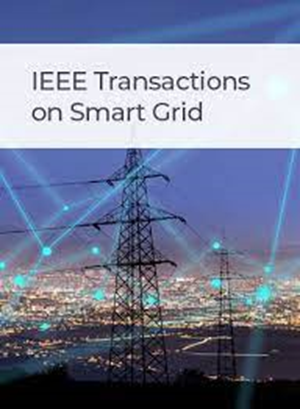Distributed Low-Frequency Oscillation Damping in Low-Voltage Islanded Multi-Bus Microgrids With Virtual Synchronous Generators
IF 9.8
1区 工程技术
Q1 ENGINEERING, ELECTRICAL & ELECTRONIC
引用次数: 0
Abstract
In the low-voltage islanded multi-bus microgrid (LVIMB-MG), the virtual synchronous generators’ (VSGs’) inertia constant and damping coefficient play an important role in low-frequency oscillations (LFOs). However, existing LFO analyses lack the consideration of microgrids’ required rate of change of frequency (RoCoF) and steady-state active power-frequency (P-f) characteristics when designing the VSG’s inertia and damping. With these practical considerations, this paper reveals that the interactions between VSGs can cause significant LFOs, posing a threat to the microgrid’s stability. In contrast, the LFOs related to the interactions between SGs are less pronounced. To this end, a distributed LFO damping (DLFOD) control is proposed to suppress the LFOs between VSGs from two aspects: the adjustment of the VSG’s phase angle mitigates the uneven instantaneous active power sharing, while the adjustment of the VSG’s active power setpoint enhances the mutual damping. Compared with existing methods, the proposed DLFOD control 1) pertains to multi-bus microgrids, 2) guarantees the RoCoF and steady-state P-f characteristics, and 3) possesses a linear structure. Furthermore, a dynamic switching variable is devised to handle the disconnection and reconnection of communication links or VSGs, which enables the DLFOD control to remain partially functional during these interruptions. Finally, the proposed method is evaluated through theoretical analysis, real-time simulations, and experiments.带虚拟同步发电机的低压岛式多总线微电网中的分布式低频振荡阻尼
在低压孤岛式多总线微电网(LVIMB-MG)中,虚拟同步发电机(VSG)的惯性常数和阻尼系数在低频振荡(LFO)中发挥着重要作用。然而,现有的低频振荡分析在设计虚拟同步发电机的惯性和阻尼时,缺乏对微电网所需的频率变化率(RoCoF)和稳态有功功率频率(P-f)特性的考虑。基于这些实际考虑因素,本文揭示了 VSG 之间的相互作用会导致显著的 LFO,从而对微电网的稳定性构成威胁。相比之下,与 SG 之间的相互作用有关的 LFO 不那么明显。为此,我们提出了分布式 LFO 阻尼(DLFOD)控制,从两个方面抑制 VSG 之间的 LFO:调整 VSG 的相位角可减轻不均匀的瞬时有功功率共享,而调整 VSG 的有功功率设定值则可增强相互阻尼。与现有方法相比,所提出的 DLFOD 控制 1) 适用于多总线微电网;2) 保证了 RoCoF 和稳态 P-f 特性;3) 具有线性结构。此外,还设计了一个动态开关变量来处理通信链路或 VSG 的断开和重新连接,从而使 DLFOD 控制在这些中断期间保持部分功能。最后,通过理论分析、实时模拟和实验对所提出的方法进行了评估。
本文章由计算机程序翻译,如有差异,请以英文原文为准。
求助全文
约1分钟内获得全文
求助全文
来源期刊

IEEE Transactions on Smart Grid
ENGINEERING, ELECTRICAL & ELECTRONIC-
CiteScore
22.10
自引率
9.40%
发文量
526
审稿时长
6 months
期刊介绍:
The IEEE Transactions on Smart Grid is a multidisciplinary journal that focuses on research and development in the field of smart grid technology. It covers various aspects of the smart grid, including energy networks, prosumers (consumers who also produce energy), electric transportation, distributed energy resources, and communications. The journal also addresses the integration of microgrids and active distribution networks with transmission systems. It publishes original research on smart grid theories and principles, including technologies and systems for demand response, Advance Metering Infrastructure, cyber-physical systems, multi-energy systems, transactive energy, data analytics, and electric vehicle integration. Additionally, the journal considers surveys of existing work on the smart grid that propose new perspectives on the history and future of intelligent and active grids.
 求助内容:
求助内容: 应助结果提醒方式:
应助结果提醒方式:


